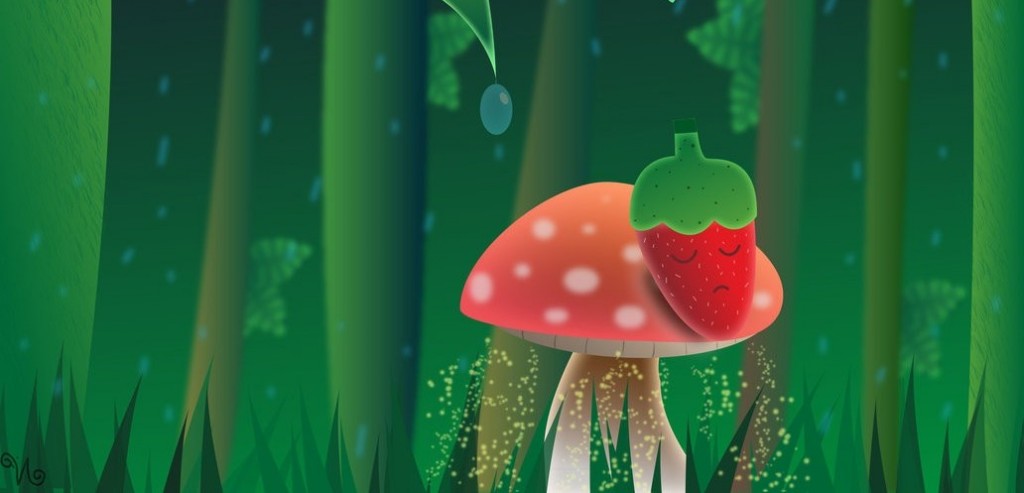A children’s story about the effects of angry and the importance of opening and sharing feelings.

Yana the angry strawberry is always angry.
She is angry in the morning.
She is angry in the daytime. She is even angry in the evening.
Yana the angry strawberry is always angry.
Yana is angry around her family and she is always angry around her friends.
She is also angry when she all by herself. She is just a very angry strawberry.
When Yana doesn’t get what she wants she gets really angry.
And when Yana gets really angry, she gets really red and really hot!
Why is Yana always angry? Her mother asked.
Yana when you are angry in the morning, in the daytime and in the evening you have no time for anything else.
You have no time to play with your friends, you have no time to be with your family.
When you are angry all the time, none of the other strawberries want to be around you.
Yana the angry strawberry was so angry by what her mother said that she stormed off and went into the field by herself.
She was all alone with nobody to be angry at. So she began to think.
And she thought all day long.
At the end of the day she returned home and told her mom why she was so angry.
Yana then felt much better and was no longer known as Yana the Angry Strawberry.
The End
The chronology of the history of events in the lives of the Voronaev children is the least to say vague and uncertain. We see only bits and pieces of their experiences. And from what we do know from theses small glimpses, the facts are so disturbing that it is easier to face reality by ignoring it. It’s much more convenient to allow the lives of the Voronaev’s children to get lost in the midst of the politics, procedure and papers (or lack thereof). But, the truth is that “The (un)Forgotten” story is not about the difficulties of anything else but the children. The children are the focus of Dr. Donev’s paper and most definitely should not be forgotten.
Reading the story of the Voronaevs takes a strong heart. It is indeed a sad one that for many of us may seem unfathomable. And yet the sparse historical accounts surrounding their life stories force the reader to confront discomfort. However, the sadist story of all is that when reading this account from the perspective of the children it was not one that I wanted to accomplish. I didn’t want to think about how the children might have felt or what they might have gone through. I refused because it was too painful. It took too much emotional anguish to even think about the pain and trauma that these children went through. Because of my refusal to contemplate the trials these children endured, I was unable to be empathetic. I was powerless to even begin to comprehend what might have gone through the minds of the children who witnessed and experienced events no child should have to. I can’t imagine what it would have been like to be a child with no “home” or much less no country. I was not able to walk a mile in their shoes. I have no idea what it is or would be like to live under Communism or to be the child of a missionary family who had so many struggles, which is putting it lightly only so I can verbalize this unfortunate reality.
When a child is in any manner separated from their parents there becomes a disconnect like no other in which a child begins to experience self-doubt, insecurity and uncertainty. When this bond is ripped apart it leaves behind feelings of anxiety and guilt. Yet when a child first hand experiences a parent being dragged off by Communist police in front of them, this leaves an entirely different scar, one which never heals. It is a scar so deep, filled with enormous traumatic stress which no one could possibly imagine. Not to mention the other dynamics of immigrations and foster care that the Voronaev children endured. These children no doubt were left with feelings of loneliness and rejection in one uncertain situation after the other.
So when we look back and we read the history of the complications of obtaining visas and the difficult times of providing a place for these children to stay in addition to worrying about the financial means to do so; when we look at the bickering, the perhaps shady details of people’s character and church politics, we must not over look that there where real children suffering in the midst of the chaos. They were not just characters of a story or pawns in a game. They were real even though they were only foreigners and they were only children of poor missionaries. They have stories to tell. They have a voice which must be heard. They most certainly were not listened too while they were alive so let us at least do them the justice of listening to their whispers beyond the grave and hear their pain, hear their trials and hear their plea to leave the politics behind and begin to see the true reality of missions work. Too often in the world of ministry, the children are the ones who suffer the most and it is quite unfortunate that the littlest ones go unheard. We must speak for the least of these among us. We can not remain silent.
Kathryn N. Donev, M.S., LPC/MHSP, NBCC
